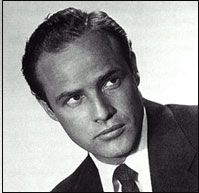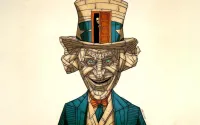July 3, 2004
David Thomson
At the end he was huge, stranded, nearly alone, his life littered by the needs (or the appearance) of more and more children, and by what was reported as near penury. It sounds bad enough to deserve some relief: being Marlon Brando had stopped being fun some long time ago -though everyone who ever knew him would tell you that fun, mischief, earthiness and raw spontaneity were his inspiration. The obituaries make Colonel Kurtz in "Apocalypse Now" seem like a rehearsal for the final isolation of our greatest actor, and there were ways, I think, in which it was a contrived and even an engineered role. For there was a mixture of self-pity and self-destructiveness in Mr. Brando that could not endure the toxic diet of straight American success. His enormous appetites - for food, for sex and for money - were all pursued to prove how free he was, and yet how childish he could be. Emotionally, he reckoned himself always a misfit, and in real terms he was surely destined to be an outcast, a great hulk whose every sigh added to his own legend. Performances date, of course, and film is a dire, cruel medium that lets us laugh at things that once moved people to the depth of their being. The Brando who became a model for the Actors Studio style, the Stanislavski Method or Elia Kazan's intensity (however you want to call it) already looks like a figure from history. Even Terry Malloy, in "On The Waterfront" (for which he won his first Oscar, in 1954) now seems a very beautiful, poetical ex-boxer. But Mr. Brando was always as much a romantic as he was a brute: there was no kind of moment in which he was more magical than when a plain man was suddenly pierced by a fine thought. On the other hand, his Vito Corleone, for which he won his second Oscar, in 1972, strikes us still as decent and rather humble. Vito is a family man and a businessman, blessed to be in America, but led astray and terribly pained to think that his most beloved son, Michael, might have to follow his own dark steps. "The Godfather" is a complex parable - richer and more lasting than "On the Waterfront" in part because Vito is so ordinary and natural a man. The film has also endured because it knows the ease with which American idealism can become dreadfully compromised. Mr. Brando's Colonel Kurtz went "up the river" in Vietnam for similar reasons - the best soldier of his time had seen how depraved the American armed forces had become. That Kurtz had seen Abu Ghraib. Look today at the 25-year-old "Apocalypse Now," and you cannot miss its dismay at where America was headed. And that is a vital part of Marlon Brando's importance. He made many very bad films, too many; he often seemed to lose interest in a film before it was finished. Yet even when the movie itself was dreadful, his performance could be exquisite. And four or five times in his life, he found himself cast in roles that were emblematic of the inner confusions of his nation. The first such role, of course, was Stanley Kowalski in "AStreetcar Named Desire." Read that play on the page and itis unmistakably a play about Blanche DuBois. Stanley is away a lot of the time. But in our culture now it is a play about the two of them, in large part because the director, Elia Kazan, had to have a male figure with whom he could identify. And so a weird chemistry took effect: Kazan's heterosexual thrust animated the gay metaphor in TennesseeWilliams's play. The sensation of "Streetcar" - the 30-minute ovations it received on Broadway in 1947 - was never just for Blanche. (Who played Blanche in that first production? It was Jessica Tandy.) It was for this new male figure on stage,so close you could smell the sweat, a brute and a beauty at the same time - and Brando the kid was so beautiful theapplause may have nearly overwhelmed the actor sometimes. But the notion that turbulence and incoherence had within them poetry and passion was not merely the engine to the Method - and all the naturalistic acting that came from it - it was the script that James Dean, Elvis Presley and just about every teenage icon ever since would act out. It is also a horribly American type: so strong, so anxious to be thought powerful, yet so desperate for tenderness. The other great role that those words could describe is Mr.Brando's American in Bernardo Bertolucci's "Last Tango in Paris," made at a moment when the movies were so intoxicated by their own advances in the portrayal of sexual behavior that they needed a big star to really,truly "do it" on screen. Only an outsider would have taken that part. Only our generosity lets us overlook the fact that Mr. Brando was never as naked or vulnerable in the film as the woman, Maria Schneider. But then you have to consider the quality of personal pain that Mr. Brando brought to the role. Mr. Bertolucci encouraged Mr. Brando to draw from his own experience for his character, and Mr. Brando's monologues, most of them improvised, are painfully raw. The film is astonishing for the way in which it established sexuality as the template of existence. That zest has slipped a bit in our movies of late - to the movies' loss - but there is evidence of the mood and the need returning. If so, then the terrible conflict of sexual yearning and familial duties that is at the heart of "Last Tango" (and which may have helped make it such a wrenching experience for Mr. Brando, who wrote afterward that it haddestroyed him emotionally) will be current again. Of course, we wanted so much more from Marlon Brando - his Lear, his Hamlet, his Uncle Vanya, his Willy Loman. We wanted the plays that might have been inspired by him if he had stayed loyal to the theater. But he went west to a city he never liked and a business that he despised, driven in part by the money he could make. In truth, he handled the money like a kid in a candy store, but then he would rebuke Hollywood for its crassness and its greed. He wanted everything, and he wanted to be the hero. Though he grew vast and decrepit, he may never have grown up. It is striking - and not entirely beyond the bounds of great dramatic timing - that his death comes at a moment when America's maturity is tragically necessary yet tormentingly distant. If only, we feel, now that he is gone, if only he could have tried again. David Thomson is the author of "The New Biographical Dictionary of Film."







